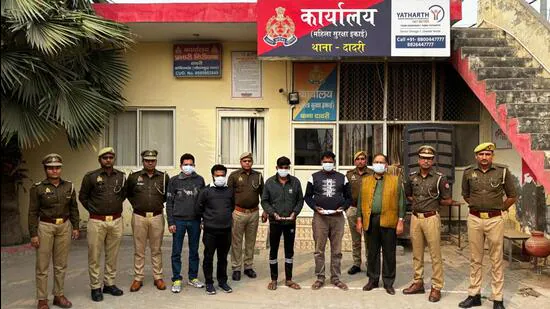Greater Noida: A recent raid by the Uttar Pradesh Police has uncovered a massive illegal cow meat operation, bringing to light glaring disparities in how justice is applied in cow-related cases. Authorities seized 153 tons of cow meat worth ₹4 crore from a cold storage facility in Greater Noida, owned by Puran Joshi. While individuals like Joshi allegedly operate large-scale smuggling rackets, Muslims across the country have faced mob lynchings over mere suspicion of possessing a kilo of beef.
The suspects arrested in the raid include Puran Joshi (51), the cold storage owner; Khushruddin Nabi (59), one of the directors; Akshay Saxena (34), the facility manager; Shiv Shankar (35), the truck driver; and Sachin Kumar (24), a helper. Forensic reports reportedly confirmed the seized meat as cow meat, not buffalo, as initially claimed. The illegal operation had reportedly been functioning since May 2024 under the guise of exporting buffalo meat.
While the police have acted decisively in this case, the incident has sparked controversy on social media, with some alleging selective reporting and communal bias in public discussions. Critics pointed out that terms like “Pandit” were unnecessarily highlighted in online narratives, despite not being mentioned in official records.
Such selective framing, critics argue, fuels communal discord and diverts attention from the broader issue: the hypocrisy in public and legal responses to cow-related crimes. While influential individuals operating massive rackets are treated with due legal process, marginalised communities, particularly Muslims, are disproportionately targeted.
Under the Uttar Pradesh Prevention of Cow Slaughter Act, the slaughter, transportation, and sale of cow meat are prohibited. Despite this, large-scale smuggling operations like Joshi’s have thrived, raising questions about enforcement and accountability. In stark contrast, marginalised individuals have been subjected to mob violence, humiliation, and even death based on mere suspicion of possessing beef.
Since 2014, India has seen a surge in lynchings targeting Muslims, often without any substantive evidence. The selective outrage has led to incidents where victims are lynched for possessing even half a kilo of meat, while smugglers transporting tons of cow meat face only legal action, not mob violence.
Authorities have urged caution in reporting sensitive cases like this one. “Balanced and accurate reporting is crucial, especially in cases that could spark communal tensions,” said a senior police official. The police have called on the public to avoid drawing premature conclusions and to consider the complete facts.
This incident highlights the stark inequality in the enforcement of laws and societal reactions. While privileged individuals like Joshi allegedly profit from large-scale cow meat smuggling, the marginalised often pay with their lives for far lesser accusations. The lack of mob outrage against Joshi and his accomplices raises uncomfortable questions about societal biases.
“Why are mobs quick to act against vulnerable communities but silent when it comes to influential individuals running massive illegal operations?” asked a social activist.
As the investigation continues, authorities have sealed the cold storage facility and destroyed the seized meat. The case serves as a reminder of the dangers of communalising sensitive issues and the importance of ensuring equal justice under the law. Without addressing these systemic disparities, the rhetoric of cow protection will remain a tool for oppression rather than a means of upholding the law.




